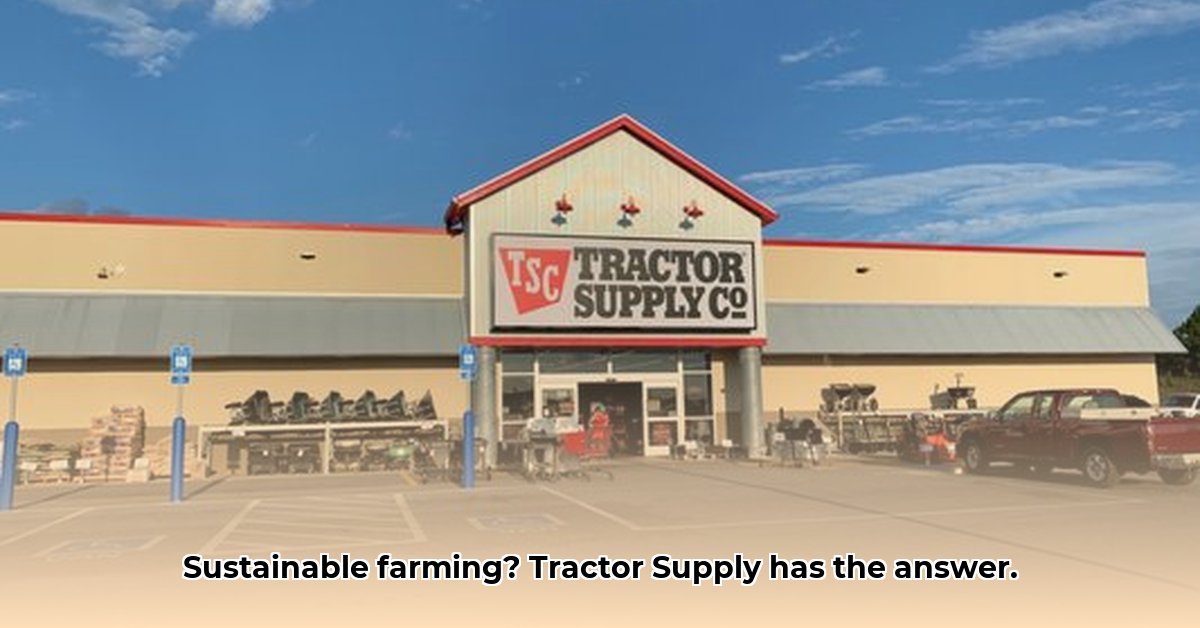
The scent of freshly tilled earth hangs heavy in the air around Glencoe, Alabama, a town where farming runs deep in the soil and in the hearts of its people. For Mary Beth Johnson, a third-generation farmer, success isn't solely about hard work; it's also about the unexpected ally she finds at her local Tractor Supply Company (TSC). This isn't just a story about farm supplies; it's a narrative of how a local business is quietly cultivating a more sustainable future for Glencoe, one harvest at a time. This report examines how Tractor Supply supports local sustainable farming practices, the challenges faced, and the collaborative steps necessary to further this vital work. For more information on TSC location, visit Glencoe TSC.
Tractor Supply's Glencoe Offerings and Sustainable Farming
Tractor Supply in Glencoe serves as more than just a retail outlet; it's a crucial resource for local farmers. Mary Beth, along with countless others, relies on TSC for a wide array of products, including seeds adapted to the local climate, tools for efficient land management, and animal feed. While TSC offers some organically sourced products and feeds produced with sustainable practices, a more detailed analysis is needed to fully grasp the extent of these eco-conscious offerings. The accessibility of these resources empowers local farmers to adopt greener practices, potentially minimizing their environmental impact while enhancing the quality of their produce. This readily available access to sustainable inputs is a major asset for the Glencoe agricultural community. But how can we be sure these products truly reflect a commitment to sustainability?
Glencoe's Agricultural Landscape: Challenges and Opportunities
Glencoe's agricultural sector showcases a blend of traditional and modern farming techniques. Many farmers already champion sustainable practices, such as crop rotation and reduced pesticide use. However, challenges remain. Securing sustainable resources, managing fluctuating market prices, and minimizing their environmental footprint are persistent concerns. These are hurdles faced by farmers across the country. But how can Tractor Supply better facilitate their adoption of more effective environmentally friendly farming methods?
Gaps in Data and Transparency: The Need for More Information
While Tractor Supply offers products capable of supporting sustainable agriculture, greater transparency is paramount. Understanding the origins of products, their environmental footprint, and their relevant certifications (such as organic or fair trade) would significantly build trust with consumers. Currently, detailed information on the sustainability of many TSC products remains limited. This lack of clarity makes a comprehensive assessment of the store's contribution to sustainable farming exceedingly difficult. More data is needed to fill this information gap. Wouldn't it be beneficial to know exactly how much of a positive effect TSC's products really have on the environment?
Actionable Steps for a Greener Future
To foster a more sustainable future in Glencoe, collaborative action is essential:
Tractor Supply's Role: TSC should conduct a thorough product inventory audit, categorizing items promoting sustainable farming practices. Customer surveys can also help gauge demand and guide future product selections. A detailed sustainability report, showing the store's commitment to environmental responsibility, is a crucial long-term goal. Finally, a loyalty program incentivizing sustainable product purchases could further promote eco-conscious consumer choices.
Empowering Local Farmers: Farmers should fully leverage TSC's resources to implement sustainable practices. The formation of a farmer's cooperative could increase buying power and improve negotiations with suppliers. Furthermore, farmers should directly communicate their needs and preferences for sustainable products to TSC.
Community Engagement: Support for local farmers' markets provides a direct connection between farmers and consumers. Community education programs, using workshops, events and social media, can highlight the environmental and economic benefits of sustainable agriculture. Partnering with local environmental organizations will expand the impact even further.
Risk Assessment and Mitigation
Ignoring sustainability presents significant risks, including reputational damage, tighter regulatory scrutiny, and diminished consumer trust. To mitigate these threats, proactive steps are necessary:
| Risk Factor | Likelihood | Impact | Mitigation Strategy |
|---|---|---|---|
| Limited sustainable product availability | Moderate | Moderate | Partner with local sustainable suppliers; increase demand through targeted marketing. |
| Insufficient community awareness | High | Moderate | Community education: workshops, demonstrations, and collaborations with local organizations. |
| Environmental impacts of product lifecycle | Moderate | High | Conduct Life Cycle Assessments (LCA) for key products; work with suppliers to minimize impacts. |
| Competition from larger retailers | Moderate | Moderate | Focus on building strong relationships with local farmers; highlight personalized service. |
A Sustainable Future for Glencoe: A Collaborative Effort
Tractor Supply plays a pivotal role in Glencoe's agricultural ecosystem. Through collaboration between farmers, TSC, and the wider community, a more sustainable agricultural future is within reach. Transparency, collaboration and a shared commitment to environmental stewardship are critical for this journey. Continued dialogue, adaptation, and dedication to a healthier environment are key to securing a brighter future for generations to come. The question, then, isn’t just if Glencoe can achieve this vision, but how quickly can we make it a reality?